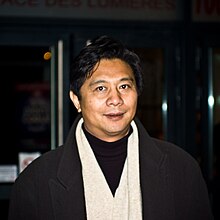Li Yang (director)
| Li Yang | |||||||||
|---|---|---|---|---|---|---|---|---|---|
 |
|||||||||
| Background information | |||||||||
| Chinese name | 李楊 (traditional) | ||||||||
| Chinese name | 李杨 (simplified) | ||||||||
| Pinyin | Lǐ Yáng (Mandarin) | ||||||||
| Born | 1959 (age 57–58) Xi'an, Shaanxi, China |
||||||||
| Occupation | Film director, Screenwriter | ||||||||
| Years active | 1990s-present | ||||||||
|
Awards
|
|||||||||
Li Yang (simplified Chinese: 李杨; traditional Chinese: 李楊; pinyin: Lǐ Yáng; born 1959) is a Chinese writer-director. Though often grouped with the so-called Sixth Generation of Chinese filmmakers, he is in fact closer in age to the Fifth Generation and in interviews has denied membership with either group, claiming that such labels are only artificial differentiations.
Born in Xi'an, China in 1959, Li studied at the Beijing Broadcasting Institute from 1985 to 1987, after which he moved to Germany. There he made several documentary films and spent some time acting on German television before eventually enrolling and graduating from the Academy of Media Arts in Cologne in 1995.
Upon his return to China, Li made his first non-documentary film, the critically acclaimed Blind Shaft (2003). The film's bleak story of two murderous con-men plying their trade in China's dangerous mines proved a major success in the international film festival circuit. Critics particularly noted how Li’s background in documentaries showed through in the film's Cinéma vérité and Italian neorealist style, in particular Li's use of handheld cameras and an ambient sound soundtrack. In China, however, the film’s critical eye toward the notoriously dangerous mining industry proved controversial and Blind Shaft was banned by the Beijing Film Bureau. However, neither the precise reasoning nor the length of the ban was made known to Li.
After his ban, Li Yang split his time between Hong Kong and Germany and gave at least one interview where he claimed,
...
Wikipedia
